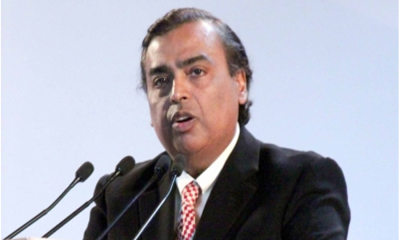Business
5G roll out should be India’s national priority: Mukesh Ambani

India must complete the migration from 2G to 4G to 5G at the earliest and the roll out of 5G should be India’s national priority, Mukesh Ambani, Chairman and Managing Director, Reliance Industries Limited (RIL), said here on Wednesday.
Delivering the virtual keynote address at the Indian Mobile Congress (IMC), Ambani said that to keep millions of Indians at the bottom of the socio-economic pyramid confined to 2G is to deprive them of the benefits of the digital revolution.
The roll out of 5G should be India’s national priority. Jio has developed a 100 per cent home-grown and comprehensive 5G solution which is fully cloud native and digitally managed. Because of its converged, future-proof architecture, Jio’s network could be quickly and seamlessly upgraded from 4G to 5G,” he emphasised.
The 5G technology will represent around 39 per cent of mobile subscriptions in India at the end of 2027, estimated at about 500 million subscriptions, a new Ericsson report said last month.
According to latest data by the Telecom Regulatory Authority of India (TRAI), Reliance Jio has more than 44.38 crore subscribers.
Ambani said that affordability has been a critical driver of the phenomenally rapid expansion of mobile subscriber base in India.
“When we talk of affordability in the policy context, we only think of affordability of services. Actually, India needs to ensure affordability not only of services, but also of devices and applications,” he added.
During the Covid times, Jio was able to introduce Fibre-to-Home to five million homes.
“If all the players in the industry work together, we can rapidly achieve a nationwide footprint of fibre, just as we reached mobile telephony to every corner of the country in the last decade,” said Ambani.
Business
Indian stock market ends in bullish tone over hopes of renewed FII inflows

Mumbai, Dec 13: Indian equity benchmarks made marginal losses during the week amid sustained FII outflows and uncertainty surrounding the US-India trade negotiations.
However, the market ended the week in a bullish tone with Nifty surging 0.57 per cent on the last trading day after the US Federal Reserve announced a 25-bps rate cut.
Benchmark indices Nifty and Sensex dipped 0.36 and 0.17 per cent during the week to close at 26,046 and 85,267, respectively.
Indian equities opened the week on a subdued note, amid continued rupee depreciation and negative global cues due to rising Japanese bond yields.
The US Fed rate cut later in the week eased liquidity concerns and fuelled hopes of renewed FII inflows. With supportive central bank policies, steady domestic investments, and optimism over trade progress despite unclear timelines, benchmarks closed the week on a strong note.
India’s year-on-year inflation rate based on the Consumer Price Index (CPI) was estimated at 0.71 per cent for November this year which was marginally higher than the 0.25 per cent in October, according to figures released by the Ministry of Statistics.
Broader indices underperformed, with the Nifty Midcap100 and Smallcap100 down 0.51 per cent and 0.67 per cent, respectively, in a week.
Sectoral performance was mixed, with IT under pressure while PSU banks, real estate and consumer durables witnessed selective buying.
Hrishikesh Yedve, AVP Technical and Derivative Research, Asit C. Mehta Investment Interrmediates, said that Nifty’s weekly chart shows buying interest at lower levels.
Nifty has 26,200 and 26,325 as stiff resistance levels while 25,700 will act as support zone, he added.
Analysts said that markets will likely remain positive in near future but sensitive to rupee stability, FII flow trends, trade agreement clarity, and cues from major central banks abroad.
Amidst risks from currency fluctuations and global trade uncertainties, improving earnings visibility and liquidity support provide a constructive backdrop and downside protection, they added.
Business
Maharashtra on path to becoming GCC hub: CM Fadnavis

Nagpur, Dec 12: Chief Minister Devendra Fadnavis on Friday announced that a crucial milestone has been achieved in the journey to establish Maharashtra as a GCC (Global Capability Centre) Hub.
He said that the Brookfield company is set to build Asia’s largest Global Capability Centre (GCC) in Mumbai, spanning approximately 2 million square feet.
The Chief Minister said that this project is expected to generate a total of 45,000 jobs, including 15,000 direct and 30,000 indirect jobs.
He stated that due to the state’s talent pool, infrastructure, and industry-friendly environment, Maharashtra is becoming a preferred destination for Global Capability Centres.
“The new GCC policy will lead to large-scale skill-based job creation and economic growth,” he added.
He also mentioned that FedEx, a global leader in the logistics sector, is keen to invest in its GCC and other operations near the Mumbai-Navi Mumbai airport area, said the government release.
The Chief Minister informed that he requested Microsoft to consider Maharashtra for their investments, noting that their largest existing investment is already in the state.
He expressed confidence that Microsoft will make a major investment in the future and take the lead in making Maharashtra an Artificial Intelligence (AI) centre.
The Chief Minister said that Maharashtra’s model for crime control with the help of Artificial Intelligence is a guiding light for the entire country.
Chief Minister Fadnavis confirmed that Microsoft has assured priority to Maharashtra in their largest ever investment in India, amounting to $17 billion.
He further highlighted the ‘Marble’ platform developed by Maharashtra, which helps detect cyber and financial crimes in just 24 hours instead of 3-4 months.
He said that this has resulted in saving people’s money and has expedited the process of tracking criminals.
Business
India’s CPI inflation estimated at 0.71 pc for Nov, food inflation stays in negative zone

New Delhi, Dec 12: India’s year-on-year inflation rate, based on the Consumer Price Index (CPI), was estimated at 0.71 per cent for November this year which was marginally higher than the 0.25 per cent in October, according to figures released by the Ministry of Statistics on Friday.
Food inflation stayed in the negative zone during November at (-) 3.91 per cent as prices of food goods fell compared to the same month of the previous year. Food inflation has now stayed negative for the sixth month in a row, easing the burden on household budgets.
However, the increase in headline inflation during November 2025 is mainly attributed to an increase in the inflation of vegetables, eggs, meat and fish, spices, and fuels compared to October, according to an official statement.
The retail inflation had eased further in October, after having plummeted to an over 8-year low of 1.54 per cent in September, as prices of food items and goods across sectors fell during the month.
The declining trend in food prices continued in October as food inflation fell deeper in the negative zone at (-) 5.02 per cent from (-) 2.28 per cent in September.
However, the overall outlook for inflation remains benign.
The RBI’s monetary policy committee (MPC) last week slashed its forecast for India’s inflation rate for the financial year 2025-26 to 2 per cent from 2.6 per cent predicted in October due to the sharp decline in food prices and the GST rate cuts playing out.
RBI Governor Sanjay Malhotra announced a reduction in the repo rate by 25 basis points to 5.25 per cent from 5.5 per cent earlier, as inflation had come down and the monetary policy could focus on boosting growth.
Malhotra said that the surge in economic growth to 8.2 per cent in the second quarter of the current financial year and the sharp decline in inflation to 1.7 per cent had provided a rare “Goldilocks period” for the Indian economy.
“The MPC noted that headline inflation has eased significantly and is likely to be softer than the earlier projections, primarily on account of the exceptionally benign food prices. Reflecting these favourable conditions, the projections for average headline inflation in 2025-26 and Q1:2026-27 have been further revised downwards.”
Malhotra also pointed out that core inflation (which excludes food and fuel) remained largely contained in September-October, despite continued price pressures exerted by precious metals. Excluding gold, core inflation moderated to 2.6 per cent in October. Overall, the decline in inflation has become more generalised, he added.
The RBI Governor observed that food supply prospects have improved on the back of higher kharif production, healthy rabi sowing, adequate reservoir levels and conducive soil moisture. Barring some metals, international commodity prices are likely to moderate going forward.
-

 Crime3 years ago
Crime3 years agoClass 10 student jumps to death in Jaipur
-

 Maharashtra1 year ago
Maharashtra1 year agoMumbai Local Train Update: Central Railway’s New Timetable Comes Into Effect; Check Full List Of Revised Timings & Stations
-

 Maharashtra1 year ago
Maharashtra1 year agoMumbai To Go Toll-Free Tonight! Maharashtra Govt Announces Complete Toll Waiver For Light Motor Vehicles At All 5 Entry Points Of City
-

 Maharashtra1 year ago
Maharashtra1 year agoFalse photo of Imtiaz Jaleel’s rally, exposing the fooling conspiracy
-

 National News1 year ago
National News1 year agoMinistry of Railways rolls out Special Drive 4.0 with focus on digitisation, cleanliness, inclusiveness and grievance redressal
-

 Maharashtra1 year ago
Maharashtra1 year agoMaharashtra Elections 2024: Mumbai Metro & BEST Services Extended Till Midnight On Voting Day
-

 National News1 year ago
National News1 year agoJ&K: 4 Jawans Killed, 28 Injured After Bus Carrying BSF Personnel For Poll Duty Falls Into Gorge In Budgam; Terrifying Visuals Surface
-

 Crime1 year ago
Crime1 year agoBaba Siddique Murder: Mumbai Police Unable To Get Lawrence Bishnoi Custody Due To Home Ministry Order, Says Report




















